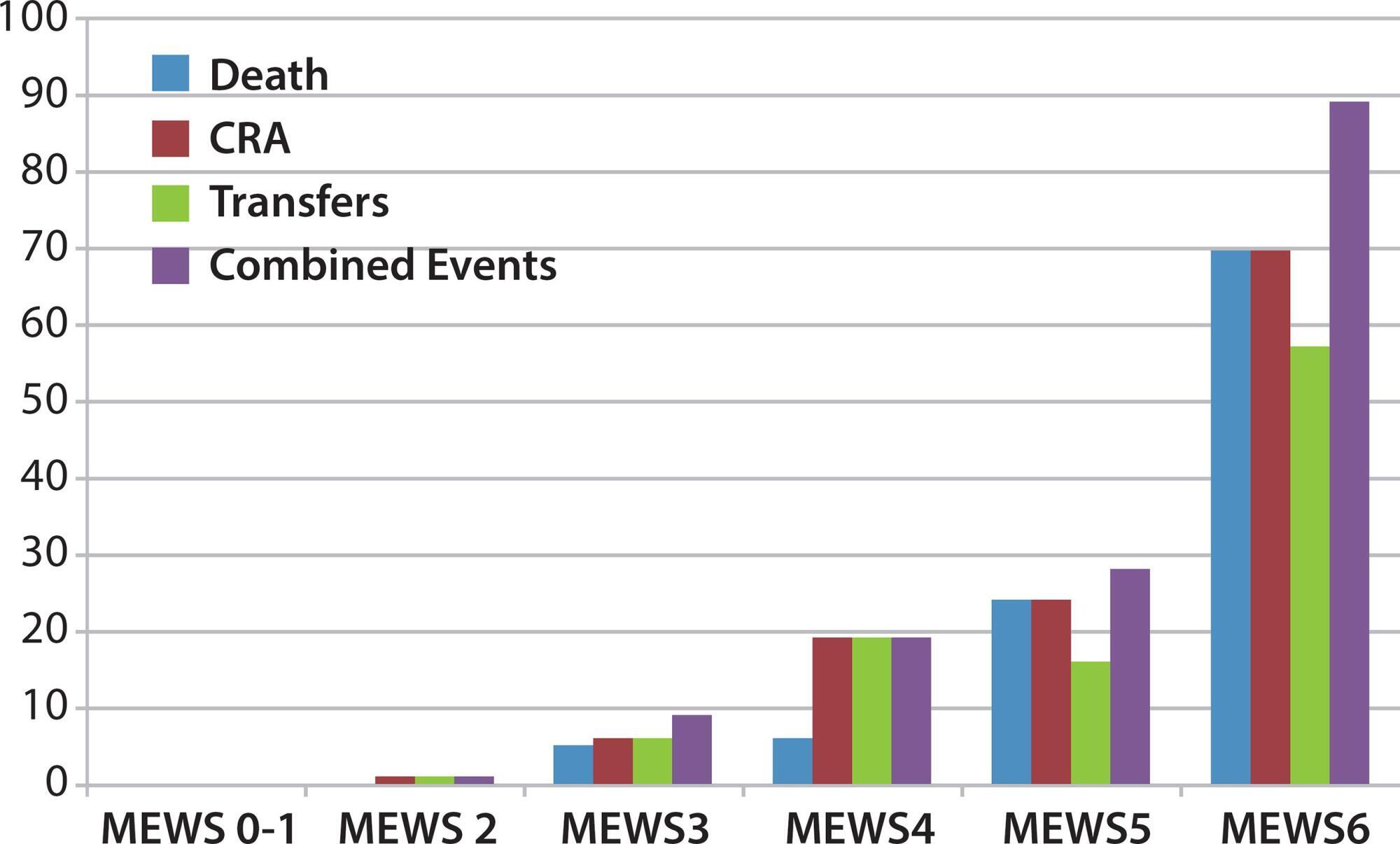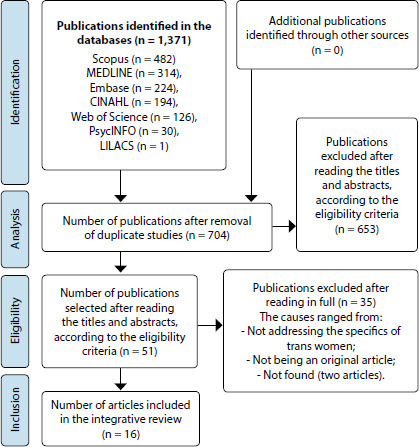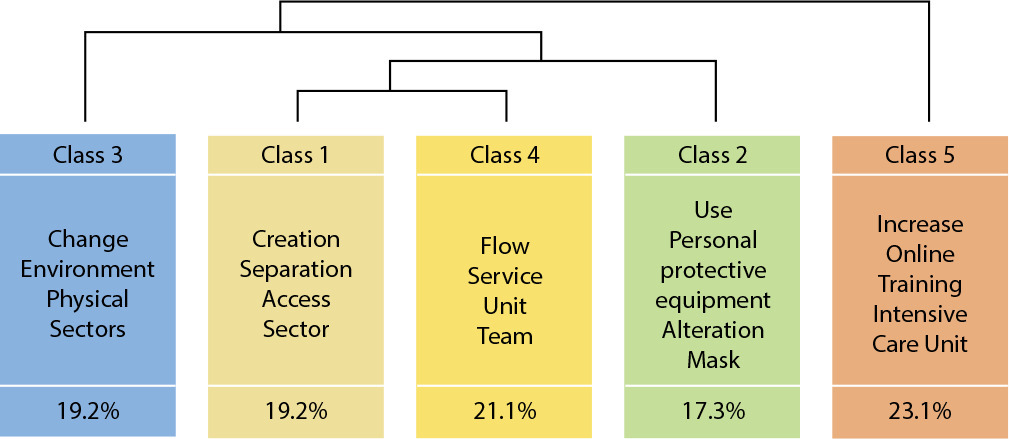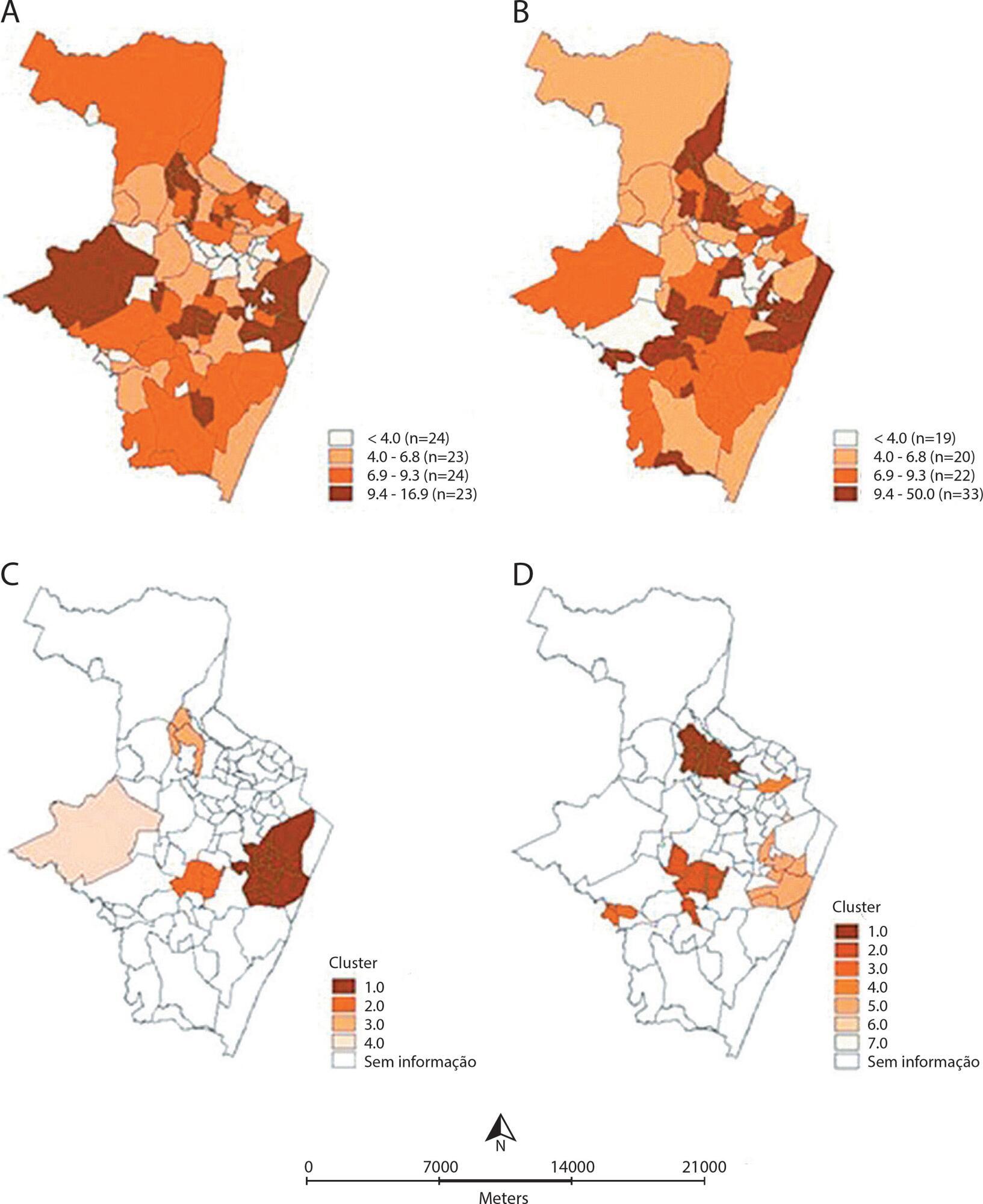-
REVIEW
Nursing process in mental health: an integrative literature review
Revista Brasileira de Enfermagem. 2017;70(1):220-230
01-01-2017
Abstract
REVIEWNursing process in mental health: an integrative literature review
Revista Brasileira de Enfermagem. 2017;70(1):220-230
01-01-2017DOI 10.1590/0034-7167-2016-0031
Views0See moreABSTRACT
Objective:
to identify evidences from the literature on the application of nursing process in care developed by the nurse in mental health.
Method:
integrative literature review between 1990 and 2013, in the PubMed, Scopus, CINAHL and LILCACS bases. Descriptors: nursing processes, mental health, nursing care.
Results:
19 papers were identified. Limited and partial usage of the nursing process in care established by a therapeutic relationship that respects the patient’s individuality. We observe care proposals systematized for patients that present pathological aspects in the limits between the physical and psychical, which might be a response to the influence of the practice based on evidences.
Conclusion:
it was found an antagonistic movement between care based on the relationship and located in the standardization of diagnoses that respond to physical malaise. A lack of evidence was verified for the usage of the nursing process in mental health, and we point at the necessity for the creation of new possibilities for dialogue between relational and biological perspectives.
-
REVIEW
Nursing practice in home care: an integrative literature review
Revista Brasileira de Enfermagem. 2017;70(1):210-219
01-01-2017
Abstract
REVIEWNursing practice in home care: an integrative literature review
Revista Brasileira de Enfermagem. 2017;70(1):210-219
01-01-2017DOI 10.1590/0034-7167-2016-0214
Views0See moreABSTRACT
Objective:
analyze scientific production on nursing practice in home care.
Method:
integrative review employing databases LILACS, BDENF, IBECS, and MEDLINE. Studies in Spanish, English, and Portuguese were included, regardless of publishing date.
Results:
after analyzing 48 articles, it was found that nursing practice in home care is complex, employing a multitude of actions by using three technologies: soft; soft-hard especially; and hard. Challenges related to the home-care training process are reported in the literature. Nurses use knowledge from their experience and scientific recommendations in conjunction with their reflections on the practice.
Conclusion:
home nursing practice is fundamental and widespread. Relational and educational actions stand out as necessary even in technical care, with a predominant need for home-care training.

-
REVIEW
Nonpharmacological interventions to improve quality of life in heart failure: an integrative review
Revista Brasileira de Enfermagem. 2017;70(1):198-209
01-01-2017
Abstract
REVIEWNonpharmacological interventions to improve quality of life in heart failure: an integrative review
Revista Brasileira de Enfermagem. 2017;70(1):198-209
01-01-2017DOI 10.1590/0034-7167-2016-0112
Views0See moreABSTRACT
Objective:
to identify articles that assessed the effectiveness or efficacy of nonpharmacological interventions to improve quality of life of people with heart failure in the literature.
Method:
an integrative literature review was performed in Lilacs, MedLine and SciELO databases, including randomized or nonrandomized clinical trials and quasi-experimental studies published between 2003 and 2014, in Portuguese, English or Spanish.
Results:
twenty-three studies were included. The categories of nonpharmacological interventions that improved quality of life of people with heart failure were: Remote health monitoring, Instructions on health practices, Physical activity follow-up and Traditional Chinese Medicine practices.
Conclusion:
these results can guide the selection of interventions to be implemented by health professionals that treat people with heart failure. Future systematic reviews with meta-analyses are needed in order to identify the most effective interventions for improving these individuals’ quality of life.

-
REVIEW
Quality of working life: assessment of intervention studies
Revista Brasileira de Enfermagem. 2017;70(1):189-197
01-01-2017
Abstract
REVIEWQuality of working life: assessment of intervention studies
Revista Brasileira de Enfermagem. 2017;70(1):189-197
01-01-2017DOI 10.1590/0034-7167-2015-0069
Views0See moreABSTRACT
Objective:
to analyze the production of knowledge about interventions on quality of working life.
Method:
integrative review study. The following databases were used for study selection: SciELO, Medline and PubMed.
Results:
the sample included 25 national and international articles that described programs and methods to acquire healthy habits at the workplace and attenuate its mental demands.
Conclusion:
by observing the number of businesses throughout the world, a low number of programs addressing workers’ health and well-being can be found, and the establishment of efficient policies at institutions could improve this situation.

-
REVIEW
Health literacy for people living with HIV/Aids: an integrative review
Revista Brasileira de Enfermagem. 2017;70(1):180-188
01-01-2017
Abstract
REVIEWHealth literacy for people living with HIV/Aids: an integrative review
Revista Brasileira de Enfermagem. 2017;70(1):180-188
01-01-2017DOI 10.1590/0034-7167-2015-0052
Views0See moreABSTRACT
Objective:
to analyze knowledge produced by research about health literacy for adult with HIV/Aids.
Method:
an integrative literature review, using six databases, was conducted between January and April of 2014. The descriptors aids and Health Literacy were used, in Portuguese, English and Spanish. A total of 130 articles were found and 14 were selected. Three categories were identified: educational technologies and health literacy for HIV/Aids; assessment of health literacy of patients with HIV/Aids; and health literacy and adherence to antiretroviral therapy.
Results:
analysis of health literacy, socioeconomic status and educational level of people living with HIV/ Aids was essential for implementation of educational strategies that increased adherence to health guidance.
Conclusion:
this study showed the importance of health literacy for working with people living with HIV/Aids, especially considering individuals who did not possess the minimum necessary for survival, which makes it relevant and encourages further research on the topic.

-
REVIEW
Letramento em saúde para pessoas com HIV/Aids: revisão integrativa
Revista Brasileira de Enfermagem. 2017;70(1):180-188
01-01-2017
Abstract
REVIEWLetramento em saúde para pessoas com HIV/Aids: revisão integrativa
Revista Brasileira de Enfermagem. 2017;70(1):180-188
01-01-2017DOI 10.1590/0034-7167-2015-0052
Views0See moreRESUMEN
Objetivo:
analizar el conocimiento producido por la investigación sobre la salud de alfabetización para adultos con VIH/SIDA.
Método:
una revisión integradora de la literatura, con seis bases de datos, se llevó a cabo entre enero y abril de 2014. Los descriptores SIDA y Educación de la Salud se utilizaron, en portugués, inglés y español. Se encontró un total de 130 artículos y se seleccionaron 14. Se identificaron tres categorías: tecnologías de la educación y alfabetización de la salud para el VIH/SIDA; evaluación de conocimientos sobre la salud de los pacientes con VIH/SIDA; y conocimientos sobre la salud y la adherencia a la terapia antirretroviral.
Resultados:
análisis de los conocimientos sobre la salud, el estatus socioeconómico y nivel educativo de las personas que viven con el VIH / SIDA era esencial para la implementación de estrategias educativas que el aumento de la adherencia a la orientación de la salud.
Conclusión:
Este estudio demostró la importancia de la alfabetización en salud para trabajar con personas que viven con el VIH / SIDA, especialmente teniendo en cuenta a las personas que no poseen el mínimo necesario para la supervivencia, lo que hace que sea aún más relevante y alienta la investigación sobre el tema.
-
Factors that interfere with the response of nurses in the monitoring of clinical alarms
Revista Brasileira de Enfermagem. 2017;70(1):172-179
01-01-2017
Abstract
Factors that interfere with the response of nurses in the monitoring of clinical alarms
Revista Brasileira de Enfermagem. 2017;70(1):172-179
01-01-2017DOI 10.1590/0034-7167-2015-0092
Views0See moreABSTRACT
Objective:
The objective of the present study was to identify and synthesize the best empirical evidence found on factors that influence the response of nurses regarding clinical alarms.
Method:
An integrative literature review was conducted with searches undertaken in ten electronic databases restricted to the period from 2005 to 2016.
Results:
Eight articles were included by cross-checking the descriptors selected.
Conclusion:
In the analysis of the studies, the following possible factors that might interfere with the response of nurses in the monitoring of clinical alarms were found: high number of false alarms, inaudibility of alarms due to the competition of sounds, difficulty in distinguishing the urgency of alarms, and increase in noise caused by the raise in the number of alarms.
-
RESEARCH
Discourses on discharge care for children with special healthcare needs
Revista Brasileira de Enfermagem. 2017;70(1):163-171
01-01-2017
Abstract
RESEARCHDiscourses on discharge care for children with special healthcare needs
Revista Brasileira de Enfermagem. 2017;70(1):163-171
01-01-2017DOI 10.1590/0034-7167-2016-0248
Views0See moreABSTRACT
Objectives:
analyze the discourse of healthcare professionals and families on the continuous and complex care for children with special healthcare needs; understand hospital discharge as a process centered on children demands and family learning.
Method:
qualitative research conducted between 2013 and 2015 through semi-structured interviews, document analysis and the sensitive creative method; the participants were ten children with special healthcare needs, six professionals and eleven family members from a public pediatric teaching hospital in Rio de Janeiro. The data underwent critical discourse analysis.
Results:
at discharge, family caregivers should learn innovative care to guarantee the maintenance of their children’s lives at home, but preparation is limited.
Conclusion:
the clinicians and the families pointed out Nurse as the most qualified professional for this preparation, since caring for these children requires nursing care skills.
-
ORIGINAL ARTICLE
Evaluation of the performance of the modified early warning score in a Brazilian public hospital
Revista Brasileira de Enfermagem. 2019;72(6):1428-1434
10-21-2019
Abstract
ORIGINAL ARTICLEEvaluation of the performance of the modified early warning score in a Brazilian public hospital
Revista Brasileira de Enfermagem. 2019;72(6):1428-1434
10-21-2019DOI 10.1590/0034-7167-2017-0537
Views0ABSTRACT
Objective:
To evaluate the performance of the modified early warning score (Mews) in a nursing ward for patients in clinical deterioration.
Method:
This is an analytical, quantitative and predictive study. Mews’ parameters (systolic blood pressure, heart rate, respiratory rate, temperature and level of consciousness) were evaluated every six hours. The following events were reported: death, cardiopulmonary arrest and transfer to intensive care. The evaluations were performed in a hospital of reference in the state of São Paulo, Brazil.
Results:
A total of 300 patients were included (57 ± 18 years old, males: 65%). There number of combined events was observed to be greater the higher the score’s value (00%; 00%; 01; 09%; 19%; 28%; 89%, respectively, for Mews 0; 1; 2; 3; 4; 5 and 6; p < 0.0001). Mews ≥ 4 was the most appropriate cut-off point for prediction of these events (sensitivity: 87%, specificity: 85% and accuracy: 0.86).
Conclusion:
Mews properly measured the occurrence of severe events in hospitalized patients of a Brazilian public hospital’s nursing ward. Mews ≥ 4 seems to be the most appropriate cut-off point for prediction of these events.
Keywords:Critical CareEmergency MedicineNursing CareOrgan Dysfunction ScoresRapid Response Teams in HospitalsSee more
-
ORIGINAL ARTICLE
Nursing professionals’ biosafety in confronting COVID-19
Revista Brasileira de Enfermagem. 2022;75:e20201104
10-18-2022
Abstract
ORIGINAL ARTICLENursing professionals’ biosafety in confronting COVID-19
Revista Brasileira de Enfermagem. 2022;75:e20201104
10-18-2022DOI 10.1590/0034-7167-2020-1104
Views0See moreABSTRACT
Objective:
To investigate the nursing professionals’ biosecurity in confronting COVID-19.
Methods:
This is a Survey type study. Nursing professionals were invited via messaging apps, using self-applied data collection forms. The sample selection (n=693) was non-probabilistic. A descriptive data analysis was conducted.
Results:
considering the biosafety aspects in facing COVID-19, 79.0% of the participants had not received training or considered it insufficient, 69.3% reported the lack of personal protective equipment during work, and 81.8% did not feel safe with the internal flux adaptations for handling COVID-19 cases.
Conclusion:
Continuous and effective nursing team training and personal protective equipment availability are necessary, as well as internal flow adjustments for attending suspected or confirmed cases.
-
ORIGINAL ARTICLE
The association between knowledge about HIV and risk factors in young Amazon people
Revista Brasileira de Enfermagem. 2020;73(5):e20190453
07-08-2020
Abstract
ORIGINAL ARTICLEThe association between knowledge about HIV and risk factors in young Amazon people
Revista Brasileira de Enfermagem. 2020;73(5):e20190453
07-08-2020DOI 10.1590/0034-7167-2019-0453
Views0See moreABSTRACT
Objectives:
analyze the association between the level of HIV knowledge among young people from Amazonas region, their sociodemographic profile and infection risk factors.
Methods:
cross-sectional analytical study, which used a structured questionnaire containing questions about sociodemographic, behavioral aspects and HIV knowledge. Data were grouped by sex and underwent ordinal and binary logistic regression analysis.
Results:
the students had an HIV knowledge deficit, associated with a low educational level of their parents and low family income. The most frequent risk factors were lack of knowledge on the part of female students regarding proper male condom use, their infrequent use in sexual relations and failure to do HIV testing. There was an association between level of knowledge and use of dating apps by female students.
Conclusions:
there was no association between level of knowledge and the preponderant risk factors, but the students’ knowledge deficit rendered them more vulnerable to infection.
-
REVIEW
Gender violence perpetrated against trans women
Revista Brasileira de Enfermagem. 2022;75:e20210173
03-07-2022
Abstract
REVIEWGender violence perpetrated against trans women
Revista Brasileira de Enfermagem. 2022;75:e20210173
03-07-2022DOI 10.1590/0034-7167-2021-0173
Views0See moreABSTRACT
Objectives:
to identify scientific evidence on gender violence perpetrated against trans women.
Methods:
integrative review, carried out in June 2020, without time frame, in the Scopus, MEDLINE, Embase, CINAHL, WoS, PsycInfo and LILACS databases. The controlled descriptors of DeCS, MeSH and their entry terms were used: “Transgender People”, “Transgender”, “Gender Identity”, “Transsexuality”, “Gender Violence”, “Aggression”, “Sexual Offenses”, “Rape”, “Violence”, “Domestic Violence”. The presentation and synthesis of the results were presented in the PRISMA-2009 flowchart.
Results:
the final sample, consisting of 16 articles, identified different types of violence (sexual, physical, verbal, psychological and financial), perpetrated by family members, strangers, police officers, intimate partners, health professionals, acquaintances, or friends.
Conclusions:
trans women suffer violence and social exclusion that result from stigma and discrimination due to gender identity and result in unrestricted damage to physical health.

-
ORIGINAL ARTICLE
Changes implemented in the work environment of nurses in the COVID-19 pandemic
Revista Brasileira de Enfermagem. 2022;75:e20201381
11-29-2022
Abstract
ORIGINAL ARTICLEChanges implemented in the work environment of nurses in the COVID-19 pandemic
Revista Brasileira de Enfermagem. 2022;75:e20201381
11-29-2022DOI 10.1590/0034-7167-2020-1381
Views0See moreABSTRACT
Objective:
to describe the changes implemented in the work environment of nurses in university hospitals considering the COVID-19 pandemic.
Methods:
this qualitative and descriptive research was developed from an online survey with 75 nurses from three Brazilian university hospitals. Data processing occurred through textual analysis with the aid of software IRAMUTEQ.
Results:
five semantic classes were obtained: Organization of units for exclusive care of patients with COVID-19; Adaptations in the use of personal protective equipment; Physical structure adaptation; Care flow institution; Increased number of beds and training courses. Final considerations: the results show the effort of healthcare and nursing professionals/managers in the development of structural adaptations and reorganizations of care processes, in the hospital context, to respond with quality and efficiency to the demands arising from the COVID-19 pandemic.

-
ORIGINAL ARTICLE
Women’s perception of labor and birth care: obstacles to humanization
Revista Brasileira de Enfermagem. 2022;75:e20210215
03-07-2022
Abstract
ORIGINAL ARTICLEWomen’s perception of labor and birth care: obstacles to humanization
Revista Brasileira de Enfermagem. 2022;75:e20210215
03-07-2022DOI 10.1590/0034-7167-2021-0215
Views0See moreABSTRACT
Objectives:
to understand women’s perception regarding the care received during labor and birth.
Methods:
this is a descriptive-exploratory, qualitative study carried out with 54 postpartum women from hospitals in the Metropolitan Region II of the state of Rio de Janeiro, from January to December 2018, using semi-structured interviews submitted to content analysis.
Results:
puerperal women’s perceptions about the childbirth care they received indicated the use of interventions, such as pressure maneuvers on the uterine fundus during the expulsion period – Kristeller maneuver, episiotomy and repeated vaginal examination and without consent. The use of institutional routines, such as zero diet, horizontal birth and disrespect.
Final Considerations:
despite the encouragement of public humanization policies, the technocratic model is still present in obstetric care during childbirth. The humanization of obstetric care requires changes in attitudes and care paradigms, in order to guarantee respect and the right to quality care.
-
ORIGINAL ARTICLE
Permanent education for good practices in the prevention of pressure injury: almost-experiment
Revista Brasileira de Enfermagem. 2019;72(6):1646-1652
10-21-2019
Abstract
ORIGINAL ARTICLEPermanent education for good practices in the prevention of pressure injury: almost-experiment
Revista Brasileira de Enfermagem. 2019;72(6):1646-1652
10-21-2019DOI 10.1590/0034-7167-2018-0778
Views0See moreABSTRACT
Objective:
To verify the effectiveness of the educational intervention through the evaluation of nurses’ knowledge about prevention of pressure injury.
Method:
A quasi-experimental study with a single group, carried out with 95 nurses from a teaching hospital in the interior of Minas Gerais, in August and September 2017. As a teaching strategy, the active methodology and hybrid teaching were used, based on the reference of the Method of the Arch of Charles Maguerez. Data were collected from a validated instrument, called the Pieper Knowledge Test, and analyzed by descriptive statistics and Student’s t-test with significance level of p <0.001.
Results:
The mean number of correct answers obtained by the nurses was 78.8% in the pre-test and 88.8% in the post-test, and the difference was statistically significant (p <0.001).
Conclusion:
The educational intervention developed was effective, since it contributed to the improvement of nurses’ knowledge.

Search
Search in:
Nuvem de Tags
Aged (144) Atenção Primária à Saúde (239) COVID-19 (104) Cuidados de Enfermagem (269) Educação em Enfermagem (151) Educação em Saúde (139) Enfermagem (930) Estudos de Validação (131) Health Education (144) Idoso (208) Mental Health (149) Nursing (987) Nursing Care (306) Patient Safety (151) Primary Health Care (284) Qualidade de Vida (104) Quality of Life (106) Saúde Mental (145) Segurança do Paciente (150) Validation Studies (108)




